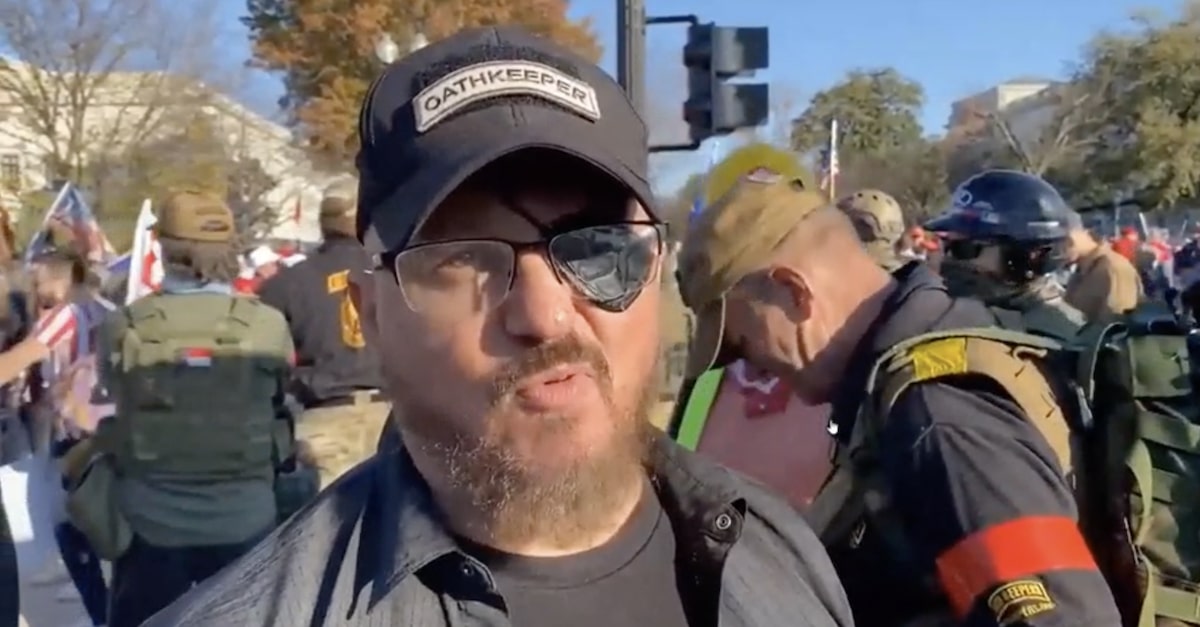
Oath Keepers leader Stewart Rhodes is seen in a still frame of a video played during his seditious conspiracy trial. (Image via DOJ)
Some five weeks after the trial began, the government rested their historic seditious conspiracy case against the Oath Keepers by referring jurors to the remarks of their founder Stewart Rhodes in a secretly recorded conversation with his would-be intermediary to former President Donald Trump.
“So I’m letting you know, my only regret, is they should brought rifles,” Rhodes said in the conversation.
The final witness for the government was FBI agent John Moore, who worked on a domestic terrorism squad in Dallas, Texas.
He took the witness stand after bombshell testimony by Jason Alpers, who claimed that Rhodes asked him — some four days after the Jan. 6th attack on the Capitol — to deliver a message asking Trump to seize power by force. Alpers said he recorded that conversation, and Moore bolstered his tale in important ways.
According to Moore, Rhodes’s cell site data indicated that he went offline during stretches of his travels from Washington, D.C., back to Texas, his home state and the location of the meeting with Alpers.
During this time period, Moore said, the Oath Keepers’ purported lawyer Kellye SoRelle transmitted what she claimed to have been a message from Rhodes to the group’s other leaders. The themes of the string of messages were unmistakable: “Clam up”; delete incriminating messages, and prepare to use force to keep Trump in the White House.
“Stand firm,” Rhodes’ message, as relayed by SoRelle, read. “Do NOT go off half cocked. There is still a chance Trump will act as Commander in Chief. I am working with others to make that a reality.”
In another string of Signal messages, Rhodes — through SoRelle — instructed Oath Keepers members to remain silent.
“DO NOT chatter about any OK members doing anything at capital [sic],” the message read. “Stop the chatter. I told you before that anything you say can and will be used against you.”
According to SoRelle, Rhodes strenuously told those leaders to erase their data.
“YOU ALL NEED TO DELETE ANY OF YOUR COMMENTS REGARDING WHO DID WHAT,” that message read.
Rhodes did, however, tell his members to be ready.
“DO prepare yourselves, your gear, your teams, and above all your community,” the Signal text states. “Whatever Trump decides to do, you will need to be ready.”
The communiqués were dated on Jan. 8, two days before his meeting with Alpers. In a recording of that meeting, Rhodes can be heard saying that he would have changed one thing about the attack on the U.S. Capitol.
“My only regret is they should have brought rifles,” he can be heard saying.
Assistant U.S. Attorney Kathryn Rakoczy played those words for the jury just before Moore’s testimony wrapped up, ending the government’s case.
In addition to their presence inside and outside the U.S. Capitol on Jan. 6, the Oath Keepers had a so-called “quick reaction force” (QRF) waiting inside and communicating from a Comfort Inn in Alexandria, Va., evidence showed. Prosecutors say they were prepared to bring guns stashed their into Washington, D.C., either over the Potomac River in a boat or by vehicle. The QRF never deployed, for reasons that remain unclear.
The Oath Keepers believed that Trump could have militarized their paramilitary group by invoking the Insurrection Act, but he never gave the order. But prosecutors note that internal Oath Keepers communications showed that they were not waiting for Trump to take action — and were frustrated that he did not, ultimately, deputize them.
Before the defense’s case begins, two of the attorneys who deferred opening statements will deliver them. Rhodes himself is also expected to take the witness stand.